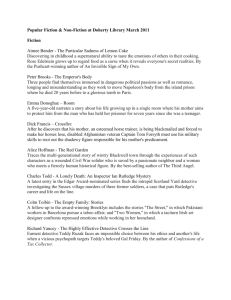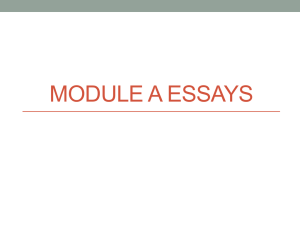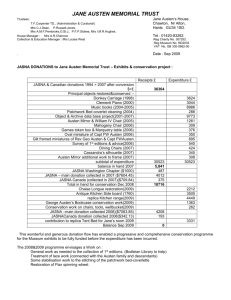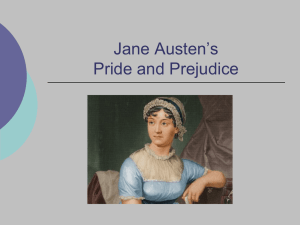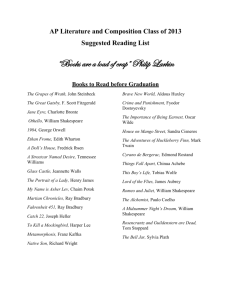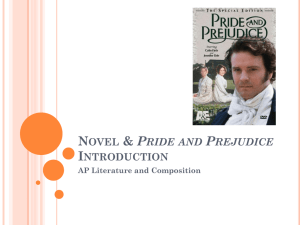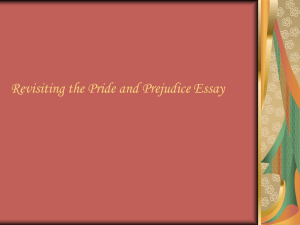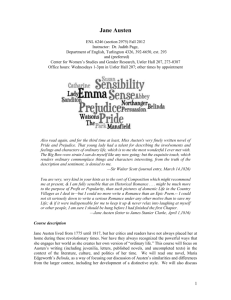ENGL 4188
advertisement
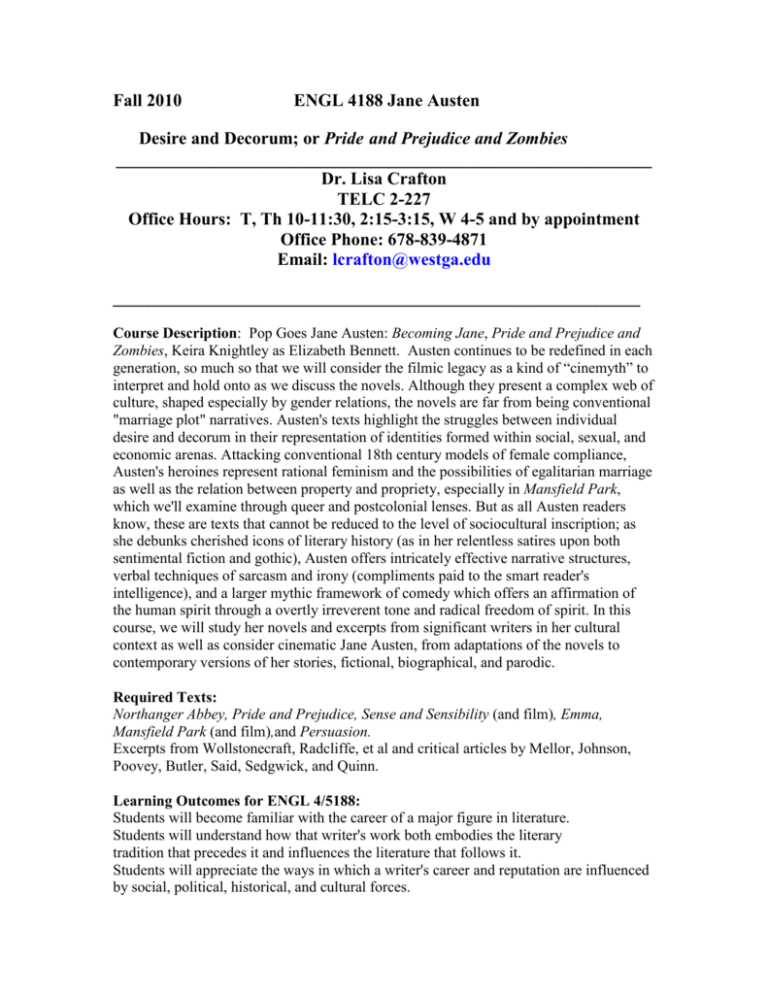
Fall 2010 ENGL 4188 Jane Austen Desire and Decorum; or Pride and Prejudice and Zombies _____________________________________________________________ Dr. Lisa Crafton TELC 2-227 Office Hours: T, Th 10-11:30, 2:15-3:15, W 4-5 and by appointment Office Phone: 678-839-4871 Email: lcrafton@westga.edu ____________________________________________________________ Course Description: Pop Goes Jane Austen: Becoming Jane, Pride and Prejudice and Zombies, Keira Knightley as Elizabeth Bennett. Austen continues to be redefined in each generation, so much so that we will consider the filmic legacy as a kind of “cinemyth” to interpret and hold onto as we discuss the novels. Although they present a complex web of culture, shaped especially by gender relations, the novels are far from being conventional "marriage plot" narratives. Austen's texts highlight the struggles between individual desire and decorum in their representation of identities formed within social, sexual, and economic arenas. Attacking conventional 18th century models of female compliance, Austen's heroines represent rational feminism and the possibilities of egalitarian marriage as well as the relation between property and propriety, especially in Mansfield Park, which we'll examine through queer and postcolonial lenses. But as all Austen readers know, these are texts that cannot be reduced to the level of sociocultural inscription; as she debunks cherished icons of literary history (as in her relentless satires upon both sentimental fiction and gothic), Austen offers intricately effective narrative structures, verbal techniques of sarcasm and irony (compliments paid to the smart reader's intelligence), and a larger mythic framework of comedy which offers an affirmation of the human spirit through a overtly irreverent tone and radical freedom of spirit. In this course, we will study her novels and excerpts from significant writers in her cultural context as well as consider cinematic Jane Austen, from adaptations of the novels to contemporary versions of her stories, fictional, biographical, and parodic. Required Texts: Northanger Abbey, Pride and Prejudice, Sense and Sensibility (and film), Emma, Mansfield Park (and film),and Persuasion. Excerpts from Wollstonecraft, Radcliffe, et al and critical articles by Mellor, Johnson, Poovey, Butler, Said, Sedgwick, and Quinn. Learning Outcomes for ENGL 4/5188: Students will become familiar with the career of a major figure in literature. Students will understand how that writer's work both embodies the literary tradition that precedes it and influences the literature that follows it. Students will appreciate the ways in which a writer's career and reputation are influenced by social, political, historical, and cultural forces. Students will gain an enhanced knowledge of how criticism shapes literary history. Students will demonstrate in both oral and written work a discipline-specific critical facility through convincing and well-supported analysis of course-related material. Students will demonstrate their command of academic English and of the tenets of sound composition by means of thesis-driven analytical prose. Relationship of course goals to program goals: * This course fulfills a requirement for single-author study for the English major and fulfills British Lit II program requirements. Specific Course Objectives for ENGL 4/5188-02: 1.Students will read the major novels and several films of Austen, learning important skills for sustained single-author study, and be able to discuss these texts critically and analytically. 2.Students will read excerpts from historical, cultural, and literary contexts of Austen, emphasizing conflicts for 18th and 19th century female identity. 3.Students will read various critical perspectives on these texts and understand the scholarly debates about Austen in literary history. 4.Students will demonstrate synthesis of materials through focused response essays and through midterm and final exams. 5.Students will complete a competent researched paper in accordance with current MLA documentation style, 8-10 pp. in length. Course Policies: 1.Reading the texts is absolutely essential. We will have frequent writing exercises in class which will require reading to have been done in advance of class meetings. Class attendance, discussion, and reading exercises will constitute a participation grade. 2.Late papers are graded down one letter grade per day late (papers are late if not turned in in class when they are due). 3.Any plagiarism—whether it be misuse of sources in the researched paper, failure to give credit to a source that has been used, or presenting texts from other sources as if they were your own words—will result in an automatic F in the course and referral to the appropriate student conduct officials. 4.Any absences beyond THREE will result in an F for the participation grade. Midterm and Final Essays Research Paper Participation 40% 30% 20% 10% Th 12 Introduction to the course: Jane Austen, Zombies, and Fight Club / assign Sense and Sensibility and initial exercise T 17 Read and bring in material cultural example of anything Austen and 2-3 sentences explaining what characteristic this highlights about Austen and what questions it raises: http://www.salon.com/books/jane_austen/index.html?story=/books/laura_miller/2 010/07/28/jane_austen_mashups Th 19 Sense and Sensibility T 24 S&S / assign articles and film Th 26 Articles by Sedgwick (excerpt) and Vincent Quinn: Loose Reading? Reports: 2 student volunteer leaders on theory articles / T 31 Discuss film / short excerpts of cultural contexts: (1 report) primogeniture and entailed inheritance / French Revolution major dates/events / (5 students: 1789, bastille as icon, reign of Terror, Robespierre, Marie Antoinette, , War with England) Th 2 Wollstonecraft, excerpt from A Vindication of the Rights of Woman / Burke, excerpt from Reflections on the Revolution in France / Report; Wollstonecraft; Report Rousseau’s Sophie T 7 Pride and Prejudice Th 9 P&P (assign essay #1) T 14 Critical Readings Debate (Fraiman v. Johnson: Reports 2 student volunteer leaders) Th16 Essay Workshop (bring draft to class) T 21 Genre Reports: epistolary form (novel) / narrative point of view / Love and Freindship / sentimental novel, Clarissa / gothic novel; interpretations of Gothic ( / Essay #2 Due Th 23 Excerpt, Radcliffe Mysteries of Udolpho/ BEGIN Northanger Abbey T 28 NA Th30 Finish NA / excerpt from Jane Austen Book Club / Review T5 Midterm Exam W Oct. 6 DEADLINE TO WITHDRAW WITH A GRADE OF W Th 7 Mansfield Park / Said “Jane Austen and Empire, ” Mnthali, “The Stranglehold of English Literature” / Reports: postcolonialism / Mansfield Decision and sig. of title T 12 Mansfield Park / temptation and theatrics / report on staging the play in the novel Th 14 Fall Break T 19 MP Film discussion / view Blake’s illustrations for Stedman Th 21 Assign essay #2 and research paper T 26 Essay 2 draft workshop Th 28 Persuasion T2 Persuasion Th4 Conference out of town: No Class T 9 Emma (students questions) Th 11 Prospectus for paper due / research paper discussion T 16 Emma / assign brief excerpt from Butler v. Johnson debate Th18 Research Paper Workshop T 23 Contemporary examples revisited (Bridget Jones Diary/ Clueless/Zombies) / Butler vs. Johnson Debate Th25 THANKSGIVING HOLIDAY T 30 Individual Conferences as needed (last day but not meeting in classroom) [Th 2 RESEARCH PAPER DUE IN MY OFFICE] Final Exam: Thur 12/9 11-1 Student Resource Presentations: 1.Sedgwick theory article 2.Quinn theory article 3.primogeniture and entailed inheritance 4.Cult of sensibility French Revolution major dates/events: 5.1789, bastille as icon, 6.Reign of Terror, 7.Robespierre Napoleon, 8.Marie Antoinette, 9.War with England 10.Mary Wollstonecraft: bio and scandal 11.Fordyce’s Sermons for young Women and conduct books for girls 12.Rousseau and misogyny: the character of Sophie 13.Critical article on Elizabeth Bennet: Fraiman 14.Critical article on Elizabeth Bennet: Johnson Genre Reports: 15.Epistolary novel 16.Point of view/ narrative selective omniscient and Austen’s innovation 17.Gothic novel: def. and history (Radcliffe, Walpole) 18.Gothic novel and feminism: overview of critics 19.Sentimental novel / Austen’s Love and Freindship 20.Postcolonialism 21.History: slavery and the Mansfield Decision / sig. of title 22.Performance of Lover’s Vows in the novel/ how sig. 23.Article on Blake’s Illustrations to Stedman, slavery, impact in film version of MP 24.Austen’s rep. of the navy/military
